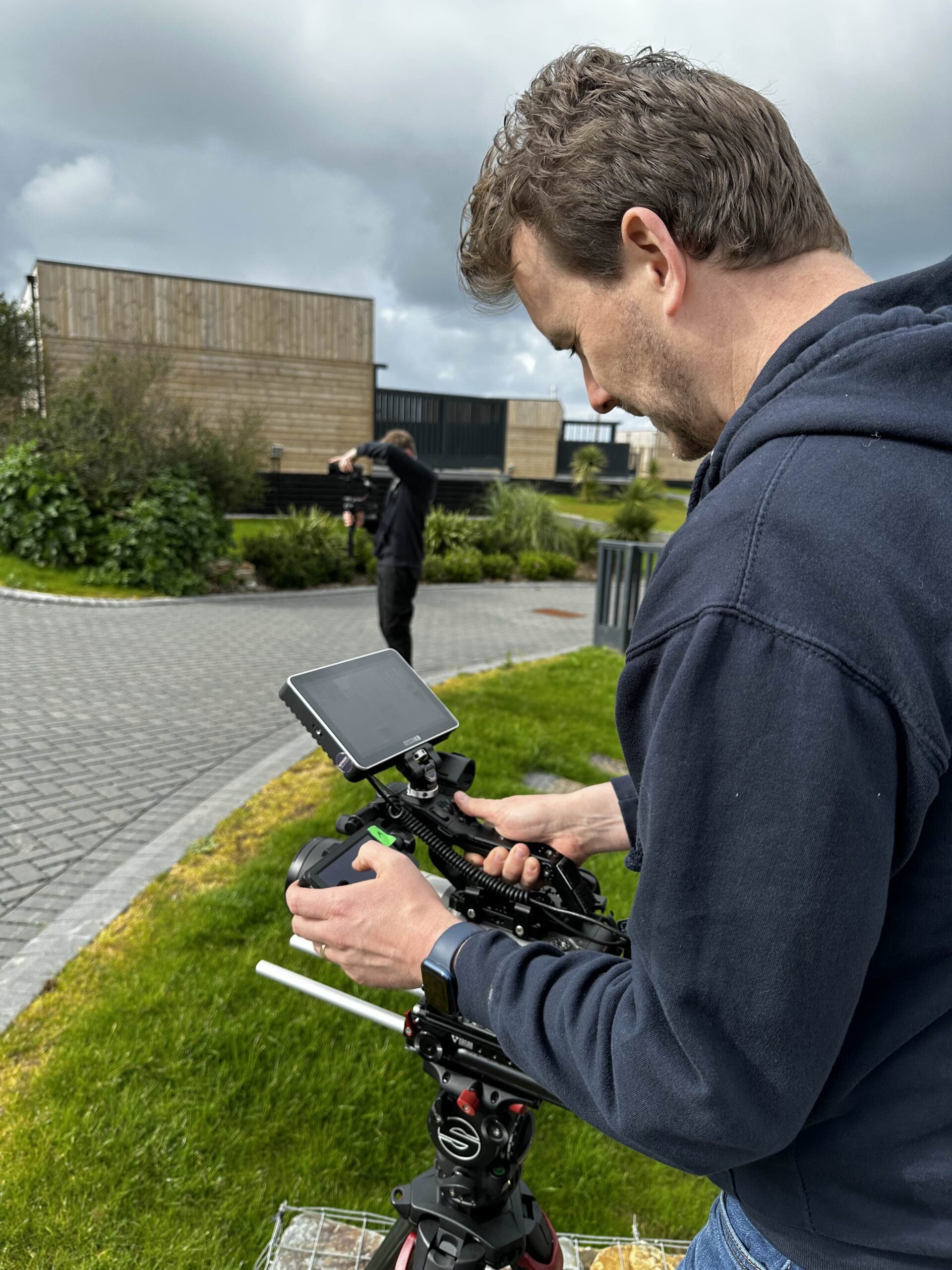How to work with a video production company is dependent on knowing what a video production company does? Knowing this will make sure you’re working with them successfully.
Working with a Video Production Company is an exciting time. It’s a great way to Bring Your Brand Story to Life as we revealed in a recent blog! There’s lots of ideas flying around as you consider how to create the best video ever, but you’re also under pressure.
Your boss is breathing down your neck.
You need to make sure that you’re getting the most out of your budget.
And you have to get a great Return On Your Investment (ROI).
That’s why we’re here to take you through what a video production company does so you know what to expect. Of course, every video project is unique but there are some things that are standard business practices. Knowing those from the outset can be helpful as it will put everyone at ease as you embark on your thrilling project. Let’s begin.
How To Work With A Video Production Company – Day 1
It’s often standard business practice to take a deposit up front when a job is booked in. This means that the production company can secure the filming dates, book crew, book venues, hire film equipment, buy or hire props and arrange accommodation and transport, etc. To do that, they will need your registered company name, address and number, your VAT number (if applicable) and all contact details. In the beginning stages, it’s useful to share the ideas of what you are trying to achieve with the video, who your target audience is and what would be the best outcome from this video content.
If you’re also working with a marketing company they might handle a lot of this and it might be to them that you pay the initial deposit.
Pre-Production
During this stage, the production company will arrange all of the particulars of the shoot (filming venues, accommodation, transport, etc.). The video production company will also create any scripts and storyboards at this point too. However, this ideation and visualisation of the concepts can sometimes be handled by a marketing agency. As such, there can sometimes be a few meetings during the pre-production stage. These help everyone clarify the deliverables and expectations of the video shoot.
What is a Recce?
This is also when any recces (from military reconnaissance) happen. Either, or both, a video production company or a marketing agency could handle this. This depends on the scope of the video project. Do you need to rent a venue to film in? If you do, then it’s important to make sure your money is being used wisely.
If you’re filming in your place of work then a recce might still be necessary to identify the right area.
Ideally you need to find a space where you can:
- Control the lighting (turn it all off ideally),
- Control any sound (including closing windows),
- A quiet end of the building (sometimes difficult in manufacturing industries),
- A large enough space to fit everyone and the kit,
- An attractive room to feature in the film,
- Any branding/signage you want to highlight needs to be put there.
You also need to view the areas you will want to film for B-roll. B-Roll is the extra footage that is used to break up the main video content, or interview.
How To Work With A Video Production Company – Filming Days
Helpful Reference Documents for Video Production Shoots
Whether a marketing agency is involved or not, this is where the production company takes the driving seat as video experts.
Depending on the type of shoot, you might have a clear storyboard as well as a script to work from. We strongly encourage creating these for all shoots, no matter the scale, as they ensure everyone has a really clear idea of what is expected. It also ensures everything is captured. For some shoots, you don’t need to adhere rigidly to script, but having one written means you have a prompt. Then if you dry up at least you have something to refer to, getting you back on track!
Using Storyboards, Scripts and Shot Lists ensures nothing is overlooked
Another helpful document to guide the filming day is a shot list.
Again, this is something that either a marketing agency or a video production company could create. Or even the client themselves! Especially if you know if there are some parts of a manufacturing process that need to be captured on camera. This might be a vital element to accompany someone describing that very process to camera.
You don’t need to go into loads of detail when creating any of these documents. Shot lists, storyboards and scripts can be created quickly without spending too much on making them look ‘pretty’. As long as you have thoroughly considered the project and these elements then that is all you need for success.
One of our favourite sayings is ‘Perfect is the enemy of good’! This means that sometimes the desire to be perfect can stop you from achieving anything at all.
What will the filming LOOK like?
Your video production team will arrive with lots of equipment including cameras and usually large lighting setups, and depending on the scale of the shoot, they may also be arriving with a large crew too. This could include make up artists, hairdressers, stylists, runners, producers, sound technicians, lighting technicians (gaffers) as well as the usual camera operators and representatives from your company that you would expect to be in attendance.
As the crew will arrive with a large amount of equipment, there are a few things that you can do in advance to prepare for the shoot.
What can YOU do to get the space ready for the film shoot?
Whether or not a marketing agency is involved, there are a few things that you will need to handle to get ready for your shoot!
If your film crew is working at a location that you have arranged, you can ensure that all accessibility passes are granted in advance, all parking permission is granted and that any potential obstacles for people getting in and out of the building with kit on the day are removed. However, if your production team has arranged the location themselves, this will all be taken care of by them in advance.
When filming, your production company might request certain environmental conditions. For example, the crew will be creating their own cinematic lighting from scratch and the best way for them to do that is for the lighting in the room to be turned off, so that they can create the most flattering lighting with their own lighting equipment. This might mean speaking with the building manager to find out the best way to turn off the lights. If this is not possible, then don’t worry as the film crew can put up blackout flags to block some of the light. This is an important process to achieve the most cinematic look.
And don’t forget the sound!
For the best sound quality, any extraneous noise needs to be kept to a minimum, so things like air conditioning systems need to be turned off in that room if possible (if they are noisy). If there’s any maintenance work nearby it needs to be paused ideally for that day. When filming in busy towns and city centres, it’s best that windows are kept closed so that urban noises are kept to a minimum. There’s nothing worse than being in the middle of a great scene with a one take wonder on camera when a helicopter comes over head!
If the sound quality is really important to the shoot, then to get the best audio, a mixture of mics and boom might be used and there might well be a sound technician controlling it all.
Ultimate Video Production Planning Checklist
We know there’s a lot to remember (and organise!) there. So we’ve created our Ultimate Video Production Planning Checklist, which is available for you to download.
This will ensure that nothing gets forgotten about and there are no nasty surprises!
How To Work With A Video Production Company – Navigating The Editing Stage
Editing is where the video comes to life.
This handled by a video production working directly with the client, unless a marketing agency is involved.
During the filming, the crew will film everything on the storyboard and shot list. Plus they generally capture a few extra bonus shots that they think will work in the final edit.
Editing includes shot selection, music, sound effects, colour grading, special effects and animation.
On the video production company’s return to the office, they will put all the footage together creating a ‘rough cut’. The rough cut is the first stage in which the film begins to resemble the final product. The video production company will put that together and then send that to the marketing agency, or the client.
After that, the video production company will await feedback from the client or the marketing agency. If there is a marketing agency involved, they will send the rough cut to the client for the client to give them feedback. The marketing agency will then give that feedback to the video production company to action.
After this, some video production companies allow you to come into the production office to work with the editor directly. This speeds up editing the rough cut dramatically as you work side-by-side seeing the edit develop. This is a great way to enhance your client experience if you like to get hands on. Otherwise, just sit back and relax and let the video production company take care of it!
Animation and Visual Effects
This is nearly always handled solely by a video production company. Although there are a few marketing agencies who have in-house animators.
Animation can be a worthwhile, very beneficial addition to your video. There are lots of different types of graphics and effects that can be added from text and motion graphics to retouching flaws and adding magical visual effects, like sparkles, for example.
Animation can be particularly helpful for viewers if they have a lot of information to take in. If you do decide that your video requires animation, then the first step is the production company supplying style frames. Giving clear instructions to your animator or animation team will rapidly speed up the process.
Amends
Regardless of any involvement from a marketing agency, this next step will speed up getting your videos signed off!
As the project reaches its conclusion, you can help get the deliverables over the finish line by giving clear feedback. It’s important to know that two rounds of amends are industry standard. As such, if you go over that there can sometimes be an extra editing fee.
Before feeding back, consider all angles and speak to all of the relevant people involved in the video project.
Finally, our three top tips for getting the best from your video production company are:
- be flexible,
- know your outcomes and
- maintain good communication.
If you want any more information on How To Work With A Video Production Company, then we’re always happy to chat all things video. Call 01242 373942 or email us on hello@nomadic.uk
And don’t forget to check out our Instagram page to see what we’ve been up to this week!
Call producer Amy on 07806306802 or email us on hello@nomadic.uk Check out our latest Instagram post to see what we are working on this week.
In a while crocodile! Love The Nomads xoxo


